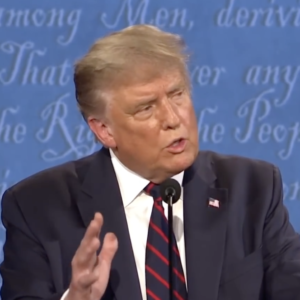In the first presidential debate, President Donald Trump accused the Philadelphia government of throwing out poll watchers from polling places.
“In Philadelphia they went in to watch,” Trump said. “They’re called poll watchers. A very safe, very nice thing. They were thrown out. They weren’t allowed to watch. You know why? Because bad things happen in Philadelphia, bad things.”
Media outlets like the Inquirer dismissed the president’s claim as false. But the facts show the president is onto something.
Poll watchers are an important part of making elections trustworthy, which is why they are codified into Pennsylvania’s election laws. They are not government employees but are usually members of a political party or campaign. Both minority and majority parties use them, and their presence adds to an election’s legitimacy through transparency.
In fact-checking the president, the Inquirer said, “There are no actual polling places open in the city right now.” But this is where the facts turn in Trump’s favor.
In support of this statement, the Inquirer acknowledged that there are, in fact, places where Philadelphians are gathering to cast ballots.
“It’s true that voters were casting ballots Tuesday, but the locations where they were doing so are satellite elections offices where mail ballots can be requested, completed, and submitted. Poll watchers don’t have the same rights at such locations as they do at traditional polling places on Election Day,” officials said.
And that’s the president’s point.
Look up “polling place” in any dictionary, and you are likely to find a definition close to this one from Oxford Languages: “a building where voting takes place during an election, typically one that normally has another function, such as a school.”
Indeed, of the 10 “satellite election offices” opened so far by the city, eight are schools.
The city appears to be playing semantic games saying a polling place is not a polling place because they have simply given it a different name — as if giving it a different name changes the very nature of the thing itself. And Pennsylvania law does allow for poll watchers at polling places. But Republicans who attempted to practice their traditional poll watching roles, they were evicted.
This entire controversy boils down to what defines a polling place versus an election office, something the Inquirer either never asked or did not think the distinction was worth relaying.
Pennsylvania AG Josh Shapiro breezily called the locations “early voting centers” and not satellite election offices.
Delaware Valley Journal asked all three of the city commissioners who are responsible for overseeing elections in Philadelphia to explain the difference between a “satellite elections office” and a polling place. The city replied but dodged the question.
Even Republican Commissioner Al Schmidt displayed his confusion as he was attempting to defend the practices when one of the rejected poll watchers recorded their conversation with him, according to an exhibit filed by the Trump legal team.
Schmidt: “The law department explained that these are not polling places. There are no votes being recorded here. It’s people filling out and requesting mail in ballot applications. So, what they do is they go in, you fill out a mail in ballot application, we generate the mail in ballot application, they complete the ballot application, and they drop it in a box.”
Trump campaign official: “So, that’s not voting?”
Schmidt: “The vote isn’t being recorded, that’s what I was trying to say.”
Trump campaign official: “What does that mean?”
Schmidt: “I don’t know. I’m not a lawyer. But here’s what I can tell you. The law department explained that these aren’t polling places, they are board of election offices just the same as the board of election office in city hall is a board of election office.”
Schmidt did not respond to multiple requests for comment, some of which were placed before the Trump campaign filed suit against the city.
Delaware Valley Journal asked the solicitor’s office to give us the same legal analysis they must have given him.
“The claims of this lawsuit are baseless and the City will defend against this and any other such efforts to tie the election up in the Courts,” the solicitor’s office told DVJ. “To be clear: the satellite offices are not polling places and the Pennsylvania Election Code does not create a right for campaign representatives to ‘watch’ at these locations.”
The city is again satisfied to say a thing is true because they say so.
In the Inquirer fact check, Schmidt pulled out a non sequitur, and the paper didn’t blink.
“We don’t give someone a poll watcher certificate to… watch somebody fill out their ballot at their kitchen table.”
A person’s kitchen table is not established and put into production under the government’s imprimatur. Unlike a person’s kitchen table, city resources are engaged here. The analogy is a farce; Schmidt should be embarrassed to have employed it and the Inquirer for having used it.
The question that legitimately remains is, could Philadelphia theoretically run identical offices on Election Day and continue to bar poll watchers? If so, these sites run counter to a transparent voting process. If not, what makes them change from a carriage to a pumpkin at the stroke of midnight?
Delaware Valley Journal has asked the nonprofit that is funding the satellite centers to provide the grant application and resulting contract in the interest of transparency. Meanwhile, DVJ has also filed ‘Right to Know Law’ requests with the city for those documents as well.
It may yet be that the judge hearing the Trump team’s lawsuit over this matter agrees with the city, and these locations will be deemed “election centers.” But if that’s the case, the judge hearing the lawsuit, Gary Glazer will most certainly give a reason why that’s so, something the city is refusing to do.
Judge Glazer must address the core of these definitions. If he does not, the General Assembly surely will.

